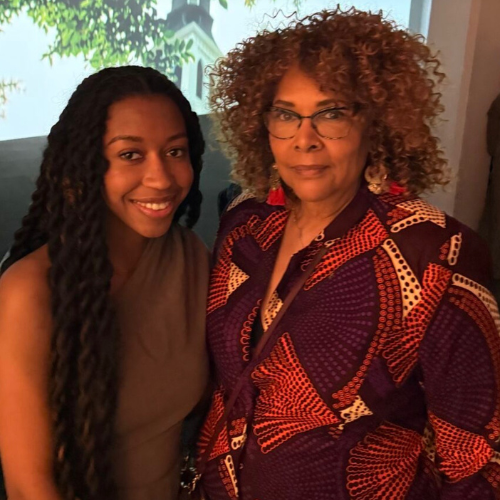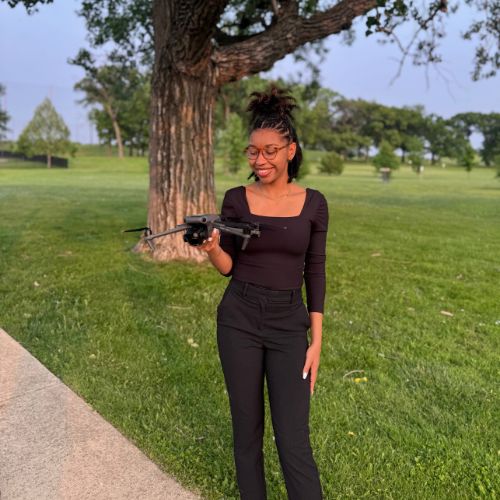The Drone’s Eye View: Neema Griffin, C’2023, and Black History in Motion
Precision in the Air, Griffin's Flight to MONUMENTS
Neema Griffin, C’2023, a filmmaker, FAA-certified remote pilot and drone operator, is making her mark on the national art scene as a key contributor to filmmaker Julie Dash’s project for the MONUMENTS exhibition in the Museum of Contemporary Art (MOCA), Los Angeles. Griffin, a documentary film major, saw her journey take flight in a Spelman drone workshop hosted by Dash and through a class taught by Mikki K. Harris at Morehouse College. Her path illustrates a powerful model of social mobility, blending technology and artistic activism to honor Black history.
The Drone as a Storyteller: Elevating the Emanuel Nine Tribute
 Griffin's aerial cinematography is featured in Dash's exhibition film, which serves as a powerful tribute to the nine souls tragically taken during the 2015 shooting at Emanuel African Methodist Episcopal Church in Charleston, South Carolina. Dash specifically highlights Griffin’s crucial role: “Our short film screening paid tribute to the Emmanuel Nine, and I couldn’t be more proud to highlight that Neema served as one of our drone operators on this meaningful production. Her technical expertise and artistic vision, honed through her training at the Atlanta University Center (AUC), brought an essential perspective to our work. Seeing former students grow into accomplished professionals and collaborators is one of the greatest joys of teaching.”
Griffin's aerial cinematography is featured in Dash's exhibition film, which serves as a powerful tribute to the nine souls tragically taken during the 2015 shooting at Emanuel African Methodist Episcopal Church in Charleston, South Carolina. Dash specifically highlights Griffin’s crucial role: “Our short film screening paid tribute to the Emmanuel Nine, and I couldn’t be more proud to highlight that Neema served as one of our drone operators on this meaningful production. Her technical expertise and artistic vision, honed through her training at the Atlanta University Center (AUC), brought an essential perspective to our work. Seeing former students grow into accomplished professionals and collaborators is one of the greatest joys of teaching.”
When asked how she approaches using technology like aerial cinematography to convey deep human emotion and historical weight, Griffin explained the expanded perspective a drone offers.
"When you add aerial footage to any project, it doesn’t just enhance production value; it expands the story itself. Drones allow us to reveal scale, environment, and emotional context in a way that’s often impossible from the ground,” Griffin said. “For a story as sacred and significant as the Emanuel Nine tribute, every frame carries weight. I’m honored to contribute to a project that pays homage to their lives and legacy. Through the drone footage, we can showcase the richness and layered history of Charleston, as well as the beauty, the spirit, and the ongoing story of resilience that this city embodies."
A Mentor’s Legacy: Shaping a Trailblazing Technologist
 Griffin credits her trajectory to the foundational support and mentorship she received at Spelman, particularly from Dash, Diana King Endowed professor in film, filmmaking, television and related media art and visual culture. Griffin is currently pursuing her MFA in film at Howard University. She is also among the few Black women to hold a drone pilot license in a largely male-dominated industry.
Griffin credits her trajectory to the foundational support and mentorship she received at Spelman, particularly from Dash, Diana King Endowed professor in film, filmmaking, television and related media art and visual culture. Griffin is currently pursuing her MFA in film at Howard University. She is also among the few Black women to hold a drone pilot license in a largely male-dominated industry.
"The drone workshop that Professor Dash established is a phenomenal opportunity for Spelman students to explore the wide scope of creative and technical roles available in the film industry, beyond the traditional paths often heard about. Her mentorship has shaped, and continues to shape, who I am as a filmmaker, creative, and technologist. She validates through her own journey that there is room for me in this industry, exactly as I envision it, even if I’m carving a path that hasn't been paved yet. She encourages me to be a trailblazer, to trust my gifts, even when they don’t fit neatly into one box,” Griffin said. “Since graduating from Spelman, I’ve realized just how intentionally the documentary film program prepared me for this next chapter, and I remain deeply grateful.”
Dash echoes this sentiment of pride and vision, seeing Griffin's success as a powerful illustration of the program's impact and the strength of the Spelman community.
“Neema’s journey from student to skilled drone operator exemplifies the excellence that comes from dedication, quality education, and the supportive community at Spelman College and the broader AUC consortium,” Dash said. “The screening at MOCA represents not just a showcase of our film, but a testament to the power of mentorship, education, and collaborative storytelling in honoring important moments in history.”
Centering Black Resilience: An Act of Resistance
As a Black woman excelling in the male-dominated fields of film and drone technology, Griffin sees her work as a profound statement. "It means everything. Representation matters, and while it can feel isolating to be one of the few, I take pride in knowing that I’m showing what’s possible for those who come after me. Through my upbringing and education, I’ve learned to trust my abilities and know that in any space I enter, I’m more than capable, not just to succeed, but to excel,” Griffin said. “Telling stories is what I’m meant to do on this earth, and I pour my all into it; each one I tell is an act of resistance. Seeing our stories from above feels symbolic. It offers a fuller view, a sense of wholeness and dignity that’s often denied in how our histories are told. When I operate a camera, whether on the ground or in the air, I feel powerful. Every image I capture contributes to history, and that feels sacred."
From Workshop Dream to National Conversation
Seeing her work featured in MOCA’s nationally recognized MONUMENTS exhibition, which encourages a reimagining of collective memory and justice, has been a powerful realization of her aspirations.
"It’s surreal to be part of something as significant as this exhibit. When I think back to where I was as a Spelman student and see where I’m headed now, it’s beyond what I could have imagined. I never expected drone operating to become such an integral part of my creative journey, but I’ve always dreamed of contributing to a project like MONUMENTS. Thanks to Professor Dash and so many people in the AUC community who have invested in me, I’m now watching my goals and aspirations come to life. Being included in this national conversation about memory and justice is both an honor and a responsibility. I hope that when people see the film, they will be reminded that remembrance isn’t passive, but an active, ongoing work that connects us all."
Griffin hopes her journey inspires future Spelman students to embrace their passions at the intersection of art, activism, and innovation.
"I want people to understand that activism can take many forms. Storytelling itself is a form of activism that challenges narratives, preserves truth, and honors humanity. I hope future Spelman students and young creators of color recognize that they don’t have to fit a mold to make an impact. My journey is proof that following your curiosity can lead to purpose and that creativity and justice can coexist beautifully."
